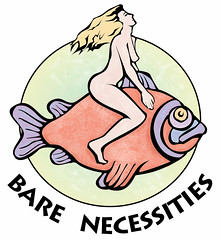 Picking up where I left of on Friday, here is how I see the key elements of Texas v. Johnson applying to public nudity and why I firmly believe as does the Naturist Action Committee, the ACLU and many others, that public nuidty is a First Amendment issue;
Picking up where I left of on Friday, here is how I see the key elements of Texas v. Johnson applying to public nudity and why I firmly believe as does the Naturist Action Committee, the ACLU and many others, that public nuidty is a First Amendment issue;
- Protected speech does not end at the spoken or written word but includes conduct which may be labeled “speech” whenever the person engaging in the conduct intends thereby to express an idea. Conduct sufficiently imbued with elements of communication fall within the scope of the First and Fourteenth Amendments.
- Though not specifically spelled out in the decision, I think it clearly states by inference that just because a particular conduct might be “offensive” even “extremely offensive” and might be offensive to many, even the majority, does not give power to the state to regulate or criminalize such conduct on the basis of that alone.
- By inference, if the burning of the American flag does not meet the test of Brandenburg v. Ohio, used by the court in reaching its decision in this case, that the state may only punish speech that would incite “imminent lawless action.” Clearly mere nudity in the same way would not also pose any “imminent threat of lawless action.”
- In the same way that the American flag has no “uniqueness” by way of special protections enumerated in the constitution that would give rise to it being considered a special “exception” to the rights guaranteed under the First Amendment and therefore giving rise to a compelling interest on the part of the state to preserve it by making it unlawful to burn the flag, in the same way neither is there any evidence that the framers of the constitution intended that public nudity be a special exception providing any compelling legal interest on the part of the state to suspend the rights afforded under the First Amendment by prohibiting or making the practice of it unlawful.
- Just as the court found that Texas already had a statute that prohibited breaches of the peace and could be used to prevent disturbances without punishing flag desecration, Texas as well as most of the other 49 states have laws that prohibit and can be used to prevent lewd conduct without punishing mere nudity. Both the United States Supreme Court as well as the supreme courts of various states has held on numerous occasions that mere nudity, in itself, is not obscene or lewd. Important legal precedents have been established for how the courts are to interpret lewdness or indecency. In Re Smith, 7 Cal.3d 362 (1972) for instance, the Supreme Court of the State of California ruled that "mere nudity in California does not constitute indecent exposure in violation of state statutes, absent additional conduct intentionally directing attention to the genitals for sexual purposes." The court specifically used “masturbation” as an example of the kind of conduct they were speaking of. Clearly a person simply sun-bathing in the nude on a public beach does not “lewdly” expose his private parts within the meaning of the applicable statute.
- In its decision, the Supreme Court reaffirmed the precedent from United States v. O'Brien, 391 U.S. 367 (1968) that state regulation of speech-related conduct is permissible only; (1) if it is within the constitutional power of the government; (2) if it furthers an important or substantial governmental interest; (3) if the governmental interest is unrelated to the suppression of free expression and; (4) if the incidental restrictions on alleged First Amendment freedoms is no greater than is essential to the furtherance of that interest.
Under the sovereignty theory (except for those powers expressly and specifically granted to the federal government under the Constitution, states retain all other powers to among other things protect the order and morality of it citizens), statutes and ordinances that prohibit or seriously restrict nudity are common in nearly all fifty states. Since the states retain all such powers and because nudity is not an expressly guaranteed constitutional right and because the states have the power even to limit guaranteed rights as long as they articulate how such limits serve an important public interest, courts have routinely found that the public’s interest in morality trumps any implied right to express one’s views by not wearing clothes. However, in light of Texas v. Johnson, this seems to be a patently faulty line of legal reasoning. The test quite commonly applied to the reasonableness of the state limiting constitutionally guaranteed rights is there must be some compelling need to do so in the interest of public safety, public health or maintenance of order. I think it is most difficult on the part of legislators to ascribe a “harm” that mere nudity might cause any person, even a person who finds nudity offensive, to justify regulating and criminalizing such conduct. And as stated in Texas v. Johnson, when laws already exist that prohibit and can be used to prevent breaches of the peace, there is no constitutionally recognized powers on the part of the state to single out such conduct as mere nudity to prohibit and punish.
My home state, Texas has three laws specifically calculated to restrict and prohibit public nudity;
PC 21.07. PUBLIC LEWDNESS. (a) A person commits an offense if he knowingly engages in any of the following acts in a public place or, if not in a public place, he is reckless about whether another is present who will be offended or alarmed by his:
(1) act of sexual intercourse;
(2) act of deviate sexual intercourse;
(3) act of sexual contact; or
(4) act involving contact between the person's mouth or genitals and the anus or genitals of an animal or fowl.
(b) An offense under this section is a Class A misdemeanor.
PC 21.08. INDECENT EXPOSURE. (a) A person commits an offense if he exposes his anus or any part of his genitals with intent to arouse or gratify the sexual desire of any person, and he is reckless about whether another is present who will be offended or alarmed by his act. (b) An offense under this section is a Class B misdemeanor.
PC 42.01. DISORDERLY CONDUCT.
(a) A person commits an offense if he intentionally or knowingly:
(1) uses abusive, indecent, profane, or vulgar language in a public place, and the language by its very utterance tends to incite an immediate breach of the peace;
(2) makes an offensive gesture or display in a public place, and the gesture or display tends to incite an immediate breach of the peace;
(3) creates, by chemical means, a noxious and unreasonable odor in a public place;
(4) abuses or threatens a person in a public place in an obviously offensive manner;
(5) makes unreasonable noise in a public place other than a sport shooting range, as defined by Section 250.001, Local Government Code, or in or near a private residence that he has no right to occupy;
(6) fights with another in a public place;
(7) discharges a firearm in a public place other than a public road or a sport shooting range, as defined by Section 250.001, Local Government Code;
(8) displays a firearm or other deadly weapon in a public place in a manner calculated to alarm;
(9) discharges a firearm on or across a public road;
(10) exposes his anus or genitals in a public place and is reckless about whether another may be present who will be offended or alarmed by his act; or
(11) for a lewd or unlawful purpose:
(A) enters on the property of another and looks into a dwelling on the property through any window or other opening in the dwelling;
(B) while on the premises of a hotel or comparable establishment, looks into a guest room not the person's own through a window or other opening in the room; or
(C) while on the premises of a public place, looks into an area such as a restroom or shower stall or changing or dressing room that is designed to provide privacy to a person using the area.
(b) It is a defense to prosecution under Subsection (a)(4) that the actor had significant provocation for his abusive or threatening conduct.
(c) For purposes of this section: (1) an act is deemed to occur in a public place or near a private residence if it produces its offensive or proscribed consequences in the public place or near a private residence; and (2) a noise is presumed to be unreasonable if the noise exceeds a decibel level of 85 after the person making the noise receives notice from a magistrate or peace officer that the noise is a public nuisance. (d) An offense under this section is a Class C misdemeanor unless committed under Subsection (a)(7) or (a)(8), in which event it is a Class B misdemeanor.
With respect to the statute on public lewdness, I have no problem at all with it as I think the conduct described in the statute should be prohibited and punished. I also think it is likely the only statute needed for regulation and prohibition of nudity. The indecent exposure statute I consider patently unconstitutional on the grounds that the conduct it seeks to prohibit is already addressed by other existing statutes that prohibit and punish truly offensive behavior. This statute should in my opinion be repealed. With respect to the disorderly conduct statute, admittedly it is a legitimate police power and duty of the state to keep the peace and while I think taken alone PC 42.01(a)(10) shares with PC 21.08 a similar constitutional fatal error; taken together PC 42.01(a)(10) and (a)(11) I think would pass constitutional muster if combined and the verbiage “and is reckless about whether another may be present who will be offended or alarmed by his act; or,” removed from (a)(10). As mentioned I have no difficulty whatsoever with the restriction and prohibition of public lewdness as long as “lewdness” is defined as something having to do with sexual arousal, excitement, titillation or gratification. I think it interesting that no where in the Texas Penal Code, fraught with definitions, does one find a definition for the term “lewd” or any of its variations. By intent perhaps?
So there you have it Ms. Makkai. Hopefully we have been able to enlighten you a bit on the subject of some very important safeguards that you and the rest of Americans share as a beneficary of our consitutional guarantees that you were obviously unaware of. So please observe that the practice of public nudity is and has always been something of a "civil right" for us "nudies". It isn't anything new at all despite what you may have believed. I swear at times that our founding fathers must have had access to some means of peering into the distant future and accounting for almost every inevitability. Truly the United States Consitution is a remarkably insightful document.







No comments:
Post a Comment